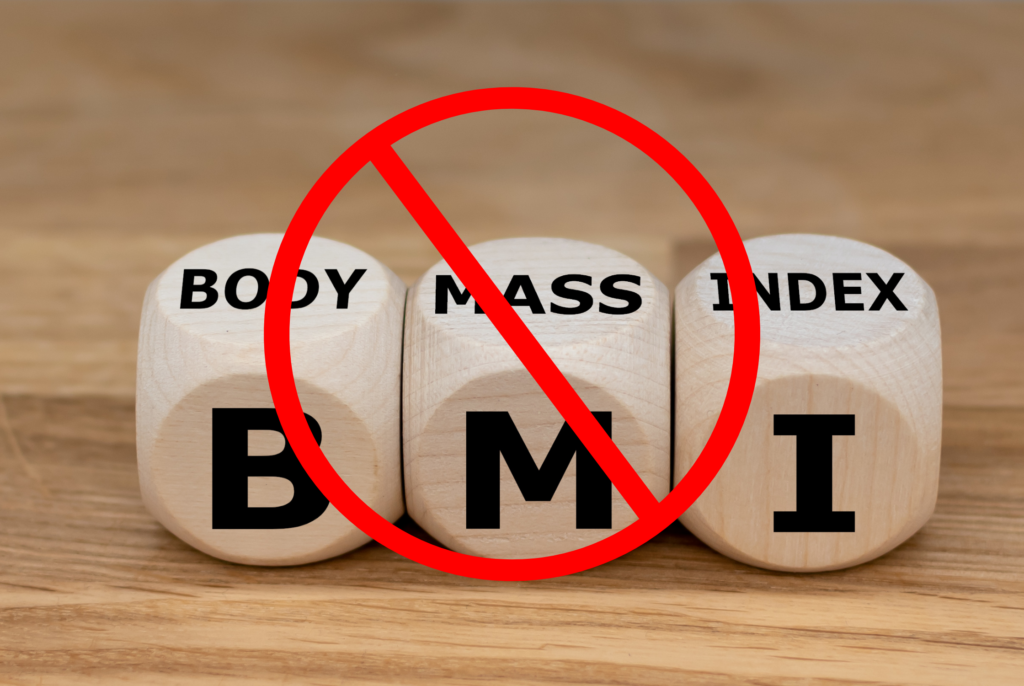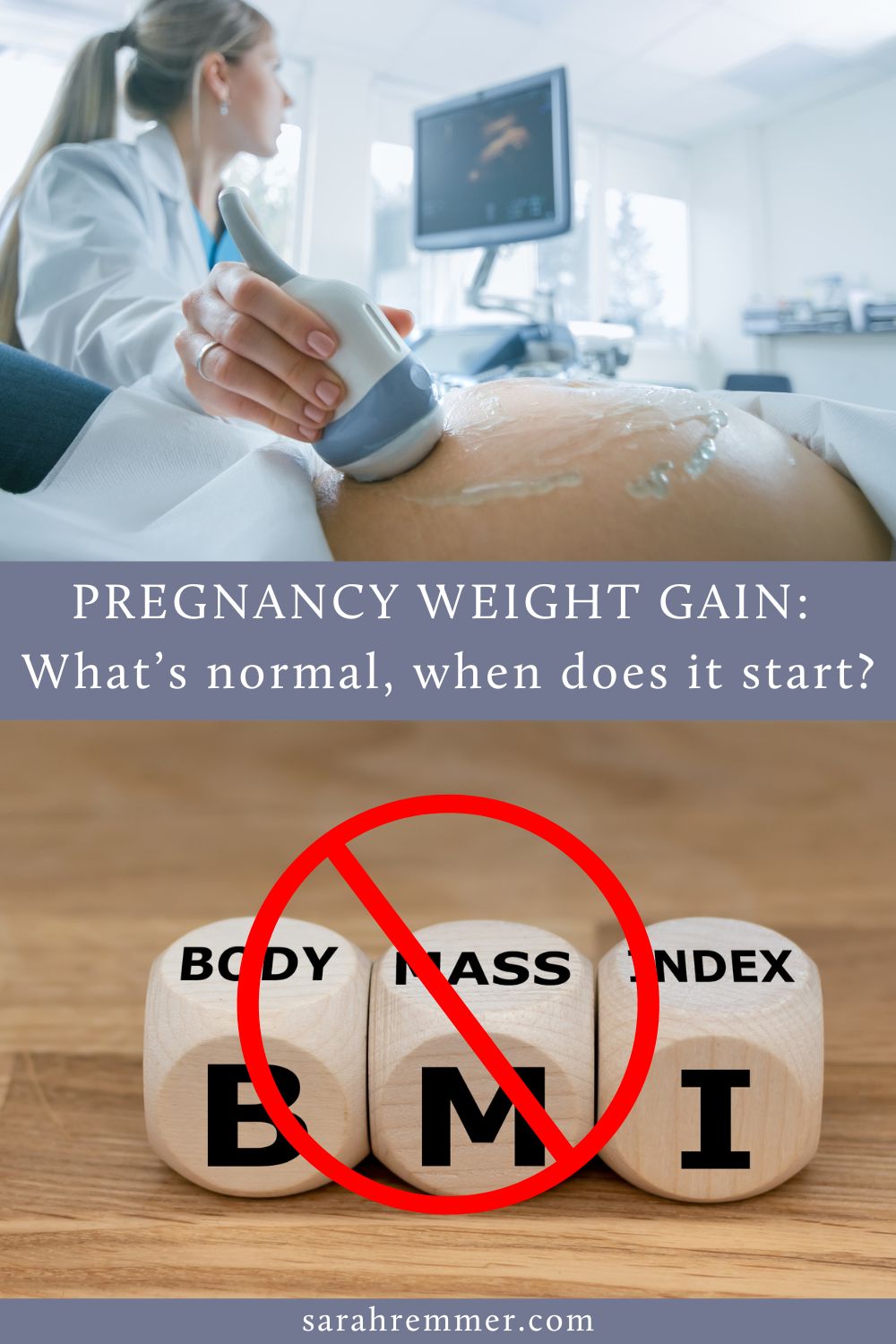Pregnancy weight gain—what’s normal and when does it start? If you’re worried that you’ve gained too much weight during pregnancy, take a deep breath because as a registered dietitian, I’m here to help answer these important questions so you can have a healthy pregnancy.

Before reading this post any further, I invite you to consider if weight stigma or fatphobia play a role in any fears around gaining weight during pregnancy. Weight gain has been, and continues to be, demonized by our culture in North America, and around the world.
Weight stigma and pregnancy weight gain
Weight stigma happens when moral judgements about weight cause stereotyping and discrimination of people in larger bodies. If we look at pregnancy through a weight stigma lens, it is easy to understand why the idea of gaining weight over the course of 9 months may lead to feelings of intense anxiety in many women. The sad truth is, this fear and worry around experiencing weight gain and body changes throughout pregnancy, all too often overshadow feelings of joy and appreciation in the beautiful journey of growing and forming new life.
While weight is an important measure to be aware of as your body expands and nourishes a developing baby, it is only a small part of the picture when it comes to leading a healthy pregnancy. My goal is to help you understand that weight, and the way that it is routinely assessed before, during and after pregnancy, as an isolated measure, should not be used to diagnose your state of health and well-being.
Continue reading to learn all you need to know about pregnancy and weight gain, and what’s “normal” for a healthy pregnancy!
When do you start gaining weight in pregnancy?
Most women will gain a few pounds of weight by the end of the first trimester (about 2-4 lbs). Since your baby is still very small in the first trimester, calorie requirements are not yet higher than what you would need before pregnancy. However, depending on a variety of factors including nausea and vomiting, genetics, maternal age, attitude towards weight gain and underlying health issues, you may gain more or less weight than just a few pounds in the first trimester.
It is important to discuss any concerns that you might have with your doctor if your gut tells you that you aren’t gaining enough weight or feel you have gained too much in this time frame. Nausea and vomiting of pregnancy, which is experienced mostly in the first trimester, may cause weight loss in some women who have severe symptoms. If you have lost more than 10-15% of your pre-pregnancy weight within the first trimester, it is important that you seek medical attention from your prenatal doctor.

How much weight should you gain during pregnancy?
This is a complex question to answer, as each weight gain journey during pregnancy is influenced by a multitude of factors, which all should to be taken into consideration when recommending weight gain targets during pregnancy. In fact, weight gain targets are more of a range, since it is impossible to accurately predict the perfect amount of tissue your individual body needs to gain for a healthy pregnancy.
The issue with pre-pregnancy BMI
The issue comes into play when health care providers use pre pregnancy Body Mass Index (BMI) as the main (and possibly only) measure when recommending weight gain targets during pregnancy. BMI is a measure calculated using someone’s weight and height. It does not take into consideration body composition, distribution of body fat and muscle mass, age, sex, or ethnicity, which all play a role in someone’s metabolic health. People are then categorized into “underweight”, “normal weight”, “overweight” and “obese” categories. These labels are problematic, attaching judgement to body size by assuming that certain behaviours are associated with bodies of each category. People in the “overweight” category, for example, are assumed to over-eat, and under-exercise. This is weight bias. All this to say, you cannot correlate someone’s health to their physical appearance.

When it comes down to it, your pre-pregnancy weight alone, should not be used to categorize and diagnose your health status, thereby determining your weight gain target. Factors including but not limited to your age, family medical history, current medications, underlying health concerns, dietary pattern, access to food, support system, mental health concerns, mobility, smoking status, sleep hygiene, and income all play a role in your pregnancy weight gain journey. For example, those with a family history of gestational diabetes (diabetes triggered in pregnancy) may be at greater risk of this condition, which in some women can be triggered by gaining weight too fast. Gestational diabetes increases risk of high blood pressure, breathing difficulties and birth complications for you and your baby.
It is important to be aware that weight stigma has deep roots in our culture and if someone (even a trusted professional) tells you that you should gain or loose weight based solely on your BMI, while pregnant or not, it should be a big red flag!
Normal amount of weight gain in pregnancy
What is “normal”? The truth is, it varies from person to person. Generally speaking, you can expect to gain between 0.5- 1 lb of weight each week during the second and third trimester of pregnancy. However, do not be alarmed if your weight gain trajectory doesn’t fit exactly into that range. One week you may gain 2 lbs, followed by a week or two of little to no weight gain. Try your best to trust that your body intrinsically knows how much weight it needs to gain and when to gain it.
Weight gain distribution during pregnancy
This table of weight gain distribution during pregnancy (adapted from Health Canada) is an example of where weight gain came from for a woman who delivered a 7 lb. 4 oz baby. Keep in mind, this is just an example to give you an idea of how weight gain can be distributed.
| Weight from | Pounds (rounded) |
| Fetus | 7 lbs 4 oz |
| Placenta | 1.5 lbs |
| Amniotic fluid | ~ 2 lbs |
| Blood volume | ~ 3 lbs |
| Uterus | ~ 2 lbs |
| Water | ~ 3.5 lbs |
| Breasts | ~ 1 lb |
| Fat stores | ~ 7.5 lbs |
| Total Weight | ~ 28 lbs |
Someone who delivers a 9lb 7 oz. baby (like myself) may experience more weight gain not only from the baby, but other areas as well. This table can simply act as a reference (not a recommendation) around tissue distribution as your body grows and nourishes a new life!
Causes of excessive weight gain in pregnancy:
Again, what does “excessive weight gain” mean? It is hard to define in a general sense without having a complete medical history. One woman’s “excessive” might look very different from another’s. And that’s okay.

Nausea and food aversions subside
It is no coincidence that nausea and food aversions in pregnancy tend to lessen (or disappear) in the second and third trimester, making it easier for most pregnant women to enjoy more variety in their eating routine once again. This is a good thing not only because you can take pleasure in eating again (thank-goodness!), but this is also when your body (and your baby) need more energy for growth and development! An extra snack or meal in the day is likely going to help you feel more satisfied and fill that nutrition gap.
Pregnancy cravings and weight gain
Pregnancy cravings can also play a role in what foods you choose to eat as well. Cravings can be a big source of guilt for many people (pregnant or not), especially when the craved food items are categorized as “junk food” in their mind. There is evidence to suggest that when pregnant women restrict craved food items in attempt to “be healthy”, they ultimately end up eating even more of the craved food item. Feelings of being out of control around food causes higher amounts of stress, negative self talk, and guilt to pile up. As you can imagine, the vicious cycle of guilt-restriction-overeating is a difficult one to get out of. This cycle can lead to higher amounts of weight gain during pregnancy especially when cravings (and restriction) are at their highest. However, what’s interesting is that in the same study, the women who were able to “lean into” their cravings, and enjoy them alongside a variety of other foods, they ended up feeling lower levels of guilt, and stopped eating when they were satisfied. I’d say that’s a pretty fascinating concept!

Practice self-care
Weight gain during pregnancy, like mentioned above, is influenced by many factors. Many of these are out of our control or unmodifiable. Some of them are potentially modifiable. That said, I want to shift the conversation away from the typical recommendations for excessive weight gain you might see out there, which suggest to “eat less, move more”. In fact, weight loss during pregnancy is not without risk.
Instead, I suggest having compassion for yourself wherever you are at in your pregnancy and practice some self-care. Here are some ways you may do that:
- Sleep—Try to get enough good quality sleep.
- Stress levels—Do what you can to reduce stress levels. Ask for support where you need it.
- Nourish your body with nutrient dense foods — such as fruits, vegetables, meat, poultry, fish, beans, lentils, grains/starches, nuts/seeds, fats etc.
- Movement – Incorporate joyful movement in your day.
I want to make an important note that just because these factors are “modifiable” does not mean that you always can adjust them. Many of them can feel overwhelming or simply unattainable given your current life situation and factors. If you would like help in addressing any factors of concern, please do not hesitate to contact your prenatal doctor or a dietitian who specializes in pregnancy.
FAQ
During the second and third trimester is when you will gain the most weight during pregnancy. As the fetus and supporting tissues steadily grow, you can expect your body weight to steadily increase as well. Steady weight gain is a normal, expected and an important part of a healthy pregnancy.
There may be several reasons that you’re not gaining enough weight during pregnancy—it could be due to excessive nausea, loss of appetite, food aversions, or other digestive concerns. If you’re concerned that you’re not gaining enough weigh, read my post on pregnancy and weight gain—how to know if you’re not gaining enough.
Conclusion
Pregnancy weight gain is a very nuanced topic, as you can see! There are many factors that influence the rate at which you gain weight, some modifiable, others not so much. If you are concerned about gaining too much weight during pregnancy, reach out to a health care practitioner who is specialized in prenatal care as well as health at every size.
References
- How and why weight stigma drives the obesity ‘epidemic’ and harms health | BMC Medicine | Full Text (biomedcentral.com)
- The Problem with the BMI – 5 Reasons Why BMI is BS (alissarumsey.com)
- Pregnant and postpartum women’s experiences of weight stigma in healthcare
- Blau LE, Lipsky LM, Dempster KW, Eisenberg Colman MH, Siega-Riz AM, Faith MS, Nansel TR. Women’s Experience and Understanding of Food Cravings in Pregnancy: A Qualitative Study in Women Receiving Prenatal Care at the University of North Carolina-
- Intuitive Eating Buffers the Link between Internalized Weight Stigma and Body Mass Index in Stressed Adults
- Association of weight discrimination during pregnancy and postpartum with maternal postpartum health
- Weight gain during pregnancy and its associated factors: A Path analysis
- Coping with stress in complicated pregnancy and gestational weight gain
- Gestational weight gain across continents and ethnicity
- Dietary patterns during pregnancy and gestational weight gain
- Diet or exercise or both for preventing excessive weight gain in pregnancy
- Prenatal Nutrition Guidelines for Health Professionals: Gestational Weight Gain – Canada.ca
- Your Guide to a Healthy Pregnancy – Canada.ca





![[AD] It’s Day 6 of my 15-Minute Supper Series and today we’re putting a delicious twist on a classic BLT to make it nourishing and meal-worthy 🤤
Make sure to comment “Spud” and I’ll send you my top dietitian tips for feeding your family on busy weeknights along with a huge list of meal ideas!
This pasta salad takes no time at all to throw together and has everything you need for a nourishing meal. I always make extra bacon for things like this, but if you don’t have any cooked bacon I find cooking it in the airfryer or stovetop the quickest 🥓
I find that this salad lasts 2-3 days in the fridge without getting too soggy. You can also add in fresh lettuce to crisp it up or add the dressing when you eat it.
I ordered all of my groceries from @spuddelivers, which always saves me time and effort and gives me peace of mind knowing that I’m using high-quality, local and sustainable ingredients. I love that they come straight to my door the day after ordering 🙌🏻
Let’s make it!
Ingredients:
* 10 slices bacon cooked and diced
* 12 ounces pasta cooked and cooled
* 1 cup homemade Ranch dressing
* 1 ½ cup baby tomatoes diced
* ½ avocado diced
* feta
* ⅓ cup red onion diced
* 1 cup romaine lettuce
* fresh parsley for garnish optional
Homemade ranch dressing:
* ¾ cup mayonnaise
* ½ cup sour cream or Greek yogurt
* ½ teaspoon dried chives
* ½ teaspoon dried parsley
* ½ teaspoon dried dill weed
* ¼ teaspoon garlic powder
* ¼ teaspoon onion powder
* Salt and pepper to taste
Make it:
1. Blend all Ranch dressing ingredients together in a small blender (or whisk by hand) and set aside.
2. In a large bowl assemble the pasta, tomatoes, avocado, cheese, red onion, lettuce and bacon.
3. Pour the dressing over and toss to combine.
4. Garnish with parsley and serve.
You are going to LOVE this meal-worthy salad, I promise!
Comment SPUD to receive my top dietitian-approved tips for feeding your family during the week, a long list of ideas, and a curated shopping list with all of the ingredients for this recipe + all of the other ideas that I share in this resource!
#sponsored #spuddelivers #15minutemeals #whatsfordinner #easymealideas #dietitianapproved](https://www.sarahremmer.com/wp-content/uploads/sb-instagram-feed-images/438745920_798281295514125_2547899647147267180_nfull.jpg)



Comments
Chris says
It’s funny as my wife gained no weight at all with our first daughter (she just looked like she’d swallowed a basketball), whereas with our second daughter her whole body shape changed.
While I’m not sure the diets were different each time they were born in very different countries, which certainly could have contributed!